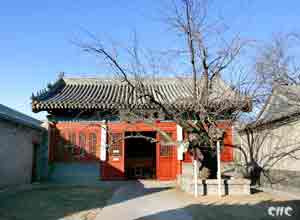|
The Memorial to Prime Minister Wen (Wen-chengxiangci) was built in 1376 during the reign of the Ming Emperor Hongwu by the Associate Commissioner of the Beiping (as the city was then called) Judiciary to commemorate the Southern Song national hero Wen Tianxiang. Today the memorial stands on the northern side of the entrance to South Fuxue Alley near Beixinqiao. According to historical records, there was once a memorial archway outside the memorial's eastern wall inscribed with "Teaching Loyalty District"(Jiaozhongfang), the old name of that section of Beijing.
The memorial once housed three ancient scholar trees, as well as a "Prime Minister" elm and a date tree with their branches and trunk leaning very noticeably southward. According to local legend, these trees represent Wen Tianxiang's longing for his old home in the south. The three scholar trees disappeared long ago, but the date tree is still thriving.

A eulogistic couplet reading "The Song Dynasty's Top Ranking Scholar and Prime Minister, the West River's Filial Son and Loyal Subject," is carved into the columns of the memorial's main hall. In the center of the hall stands a sculpture Wen Tianxiang holding an official tablet before him. To the left with Wen's likeness and below with the 32-character "Clothes and Belt Inscription "which ends with the lines "… and today and ever after his conscience is clear." four large inscribed wooden plaques hang inside the hall. They read, "Loyalty and devotion to old friends;" "Righteousness in heaven and on earth;" "The utmost in benevolence and justice;" and "The Song Dynasty survives here." A screen bears the complete text of Wen Tianxiang's Song of Righteousness (Zhengqige).
Wen Tianxiang (1236-1282) was born in Luling (present-day Ji'an), Jiangxi Province. In 1256, he was the top scholar in the imperial examinations and successively held posts in the Ministry of Punishments and in local government offices in Hunan and Jiangxi. When the Yuan armies began moving southward and steadily closed in on Hangzhou, Wen Tianxiang received orders to negotiate a truce, but was arrested by the Yuan fore. He escaped and returned to Wenzhou where he led the Song troops into battle. In 1278, Wen was taken prisoner after suffering a defeat at Haifeng and made two unsuccessful suicide attempts. Later, he was taken by the Yuan forces to Chao'an County and in the following year ordered by the Yuan general Zhang Hongfan to write a letter to the anti-Yuan faction headed by Zhang Shijie, advising them to surrender. Wen sternly refused and wrote a poem which ends with two famous lines:
What man is ever immune from death?
Leave me with a loyal heart shining in the pages of history.
In April 1279, Wen was sent north under armed escort and reached the capital Dadu on October 1. Here he was held captive for four years and despite all manner of threats and inducements on the part of the Yuan rulers to win him over, he was put to death. Before his execution he is reputed to have said: "I have done all I can for my country." When the chief executioner asked him if he refused and said, "Because I am dying for my country, there is nothing to say." His remains were removed to his wife was made a captive in Dadu, and when the news of her husband's death reached her, she said, "My husband has remained faithful to his country; I shall not betray him," and with that seized a knife and cut her throat.
Wen Tianxiang's execution site was traditionally thought to have been the firewood market in the "Teaching Loyalty District" near the present-day entrance of Fuxue Alley, and thus the memorial was established here. But according to one modern scholar, the execution grounds in the 13th century were located in the southern part if the city and, because the majority of executions during the Ming and Qing dynasties were carried out there as well, Wen's memorial should properly be located there.
Many of the patriotic poems and essays in Wen Tianxiang's complete works were widely known in China by the time he was incarcerated in the capital. His famous Song of Righteousness was written while he was in the Yuan Dynasty military prison.
The Memorial to Prime Minister Wen is located on the grounds of the Fuxue Alley Primary School in the Dongcheng District. The memorial contains only a fragment of a stela, while the remainder of its contents has become part of the permanent collection of the Beijing Bureau of Cultural Relics.
Address: No.63, Fuxue Hutong, Dongcheng District;
Entry ticket: 5 yuan;
Opening hours: 9:00 AM-4:00 PM;
Traffic: Bus No.s 2, 13, 42, 104, 108, 113 and 115;
Tel: 86-10-64014968.
(China.org.cn)
|

